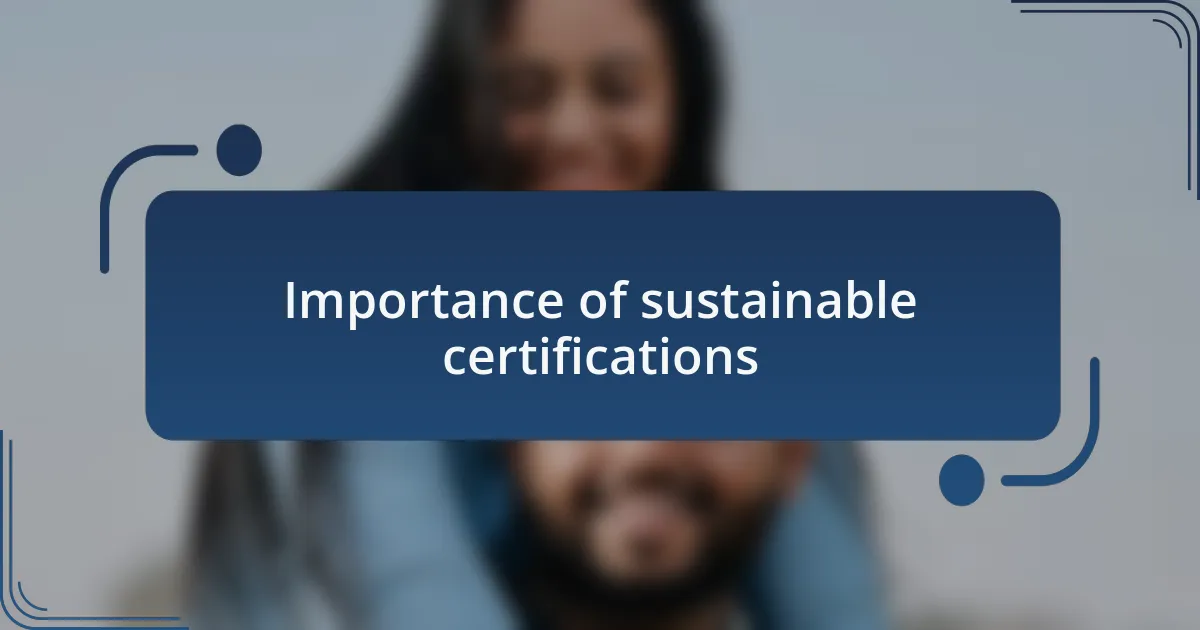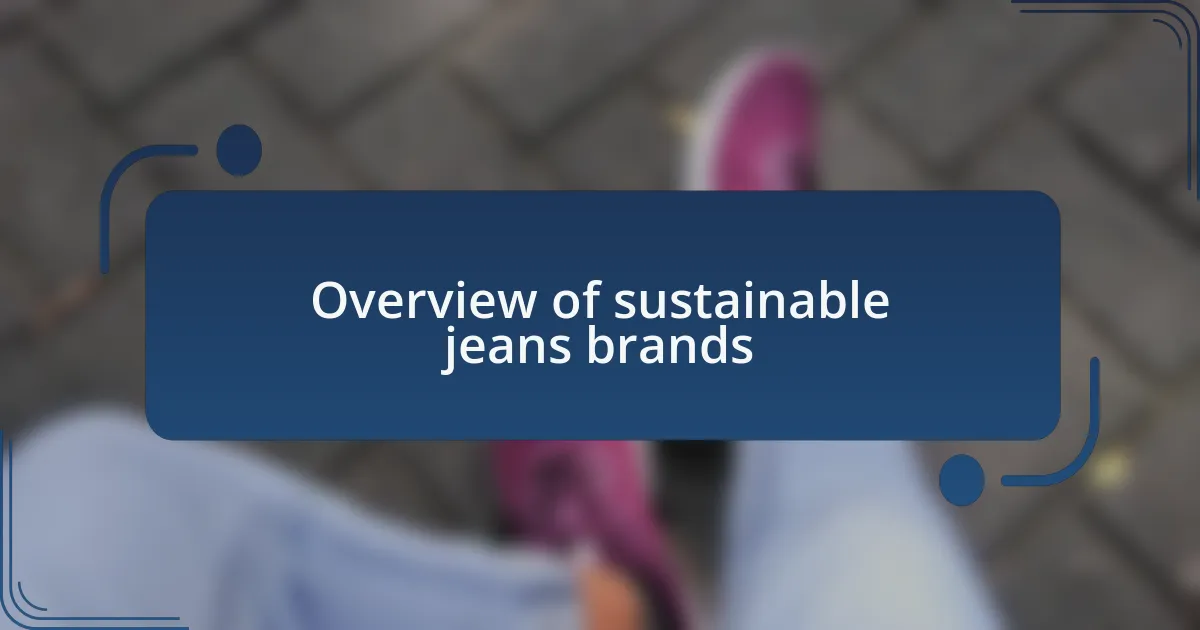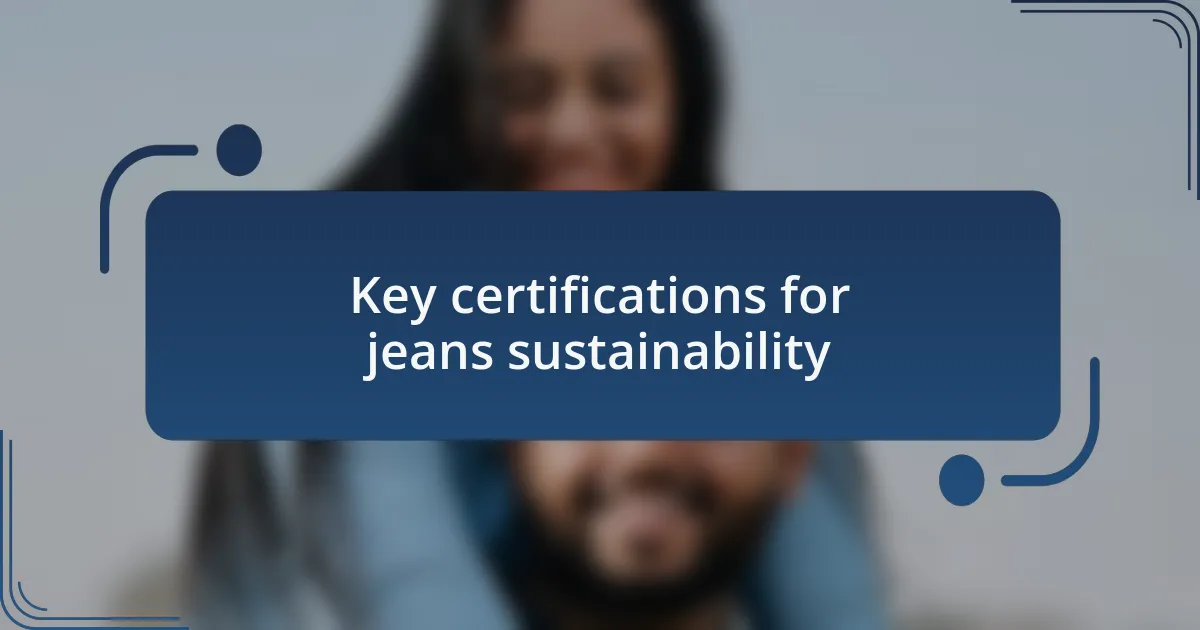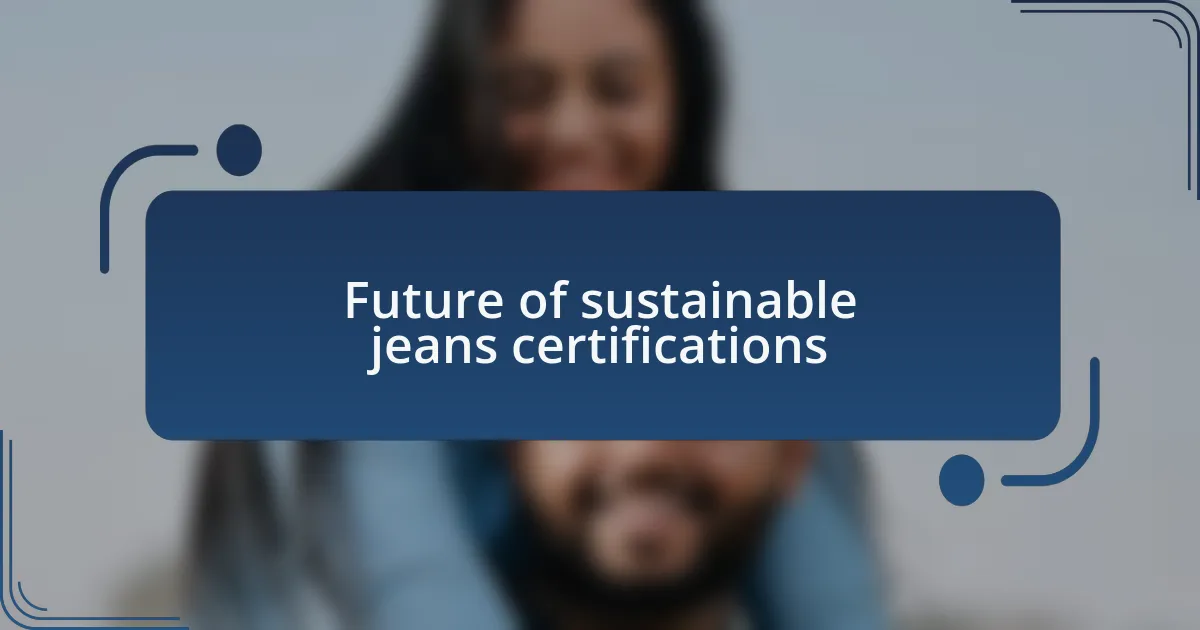Key takeaways:
- Sustainable certifications, such as GOTS and Fair Trade, guide consumers towards ethical fashion choices while fostering transparency and accountability in the industry.
- These certifications promote responsible practices and empower consumers to encourage brands to adopt sustainable and ethical standards.
- Brands committed to sustainability often focus on eco-friendly materials and fair labor practices, transforming consumer purchases into impactful choices for the environment and society.
- The future of sustainable jeans certifications may include more third-party verification and active consumer involvement, enhancing collaboration and clarity in sustainable fashion.

What are sustainable certifications
Sustainable certifications are like badges of honor for brands that prioritize environmental and social responsibility. When I first stumbled upon these certifications, I was genuinely surprised at the depth of commitment they represent. It made me wonder, how did I ever overlook them before?
These certifications ensure that products meet stringent standards concerning sustainability, covering everything from organic materials to fair labor practices. I can vividly recall the moment I found a pair of jeans with a well-known certification. The peace of mind I felt, knowing that my purchase supported ethical practices, was truly rewarding.
It’s fascinating to see how various certifications, like GOTS (Global Organic Textile Standard) or Fair Trade, signal a brand’s dedication to making a positive impact. Do you ever consider the journey your clothes have taken before they reach you? I certainly do now, and it’s become an essential part of my shopping experience.

Importance of sustainable certifications
Sustainable certifications hold immense importance because they guide consumers toward ethical choices. I remember the first time I noticed a certification on a pair of jeans; I felt a genuine connection to the values behind that label. It was a reminder that my choice at the checkout could contribute to something much larger than fashion.
These certifications also foster transparency in the fashion industry, something I’ve come to appreciate deeply. When I learned about the rigorous processes brands undergo to earn these certifications, it made me feel empowered as a consumer. Isn’t it remarkable how a simple label can transform the way we think about our purchases?
Moreover, sustainable certifications help foster a shift in industry practices. I often think about how my support for certified brands encourages others to follow suit. If more consumers demand these standards, brands will continue to evolve and prioritize sustainability. It’s a ripple effect that starts with each informed choice we make.

Overview of sustainable jeans brands
Sustainable jeans brands are truly changing the landscape of fashion. Recently, I stumbled across a brand that not only focuses on eco-friendly materials but also champions fair labor practices. Wearing those jeans felt different; I realized I was part of a movement that prioritized not just style but also ethics.
When I first started researching sustainable brands, I found myself drawn to the stories behind them. For instance, one brand’s commitment to using recycled water in their manufacturing process struck a chord with me. It made me think about how each pair of jeans I choose contributes to water conservation efforts. Isn’t it amazing how fashion can intersect with sustainability in such a profound way?
In my journey, I’ve come across several brands adopting innovative practices. Whether it’s using organic cotton or investing in circular fashion models, each choice makes a statement. I often wonder, can our wardrobes become a canvas for sustainability? By supporting these brands, we aren’t just making fashion choices; we are advocating for a better planet and a more equitable industry.

Key certifications for jeans sustainability
When exploring sustainable certifications for jeans, I stumbled upon the GOTS (Global Organic Textile Standard). This certification ensures that cotton is grown without synthetic fertilizers and pesticides, making me more conscious of my clothing choices. I remember the first time I held a pair of GOTS-certified jeans; they felt softer and more authentic, reminding me that my fashion choices could support organic farming.
Then there’s the OEKO-TEX certification, which guarantees that textiles are free from harmful substances. The moment I learned about this certification, it connected with my concerns about chemical exposure in everyday clothing. Knowing that my jeans were tested for safety made me feel more secure and conscious about what I wear—who knew that safety could be stylish?
Lastly, the Fair Trade certification caught my attention due to its focus on ethical labor practices. I find it empowering to wear jeans that support fair wages and safe working environments for the people who make them. It adds another layer of meaning to my wardrobe; every time I slip them on, I feel a connection to the artisans behind the seams. Isn’t it incredible how a simple pair of jeans can embody both sustainability and ethics?

My journey exploring sustainable certifications
My journey exploring sustainable certifications started off with a casual conversation at a local eco-fashion event. A vendor enthusiastically explained the significance of the Cradle to Cradle certification, emphasizing how it promotes circularity in fashion. I couldn’t help but feel inspired; the idea that my jeans could someday contribute to a closed-loop system made me rethink not just my purchases but also my overall impact on the planet.
While delving deeper into my research, I encountered the Responsible Wool Standard (RWS). I still remember reading about it during a rainy afternoon, when I learned how RWS ensures animal welfare and sustainable practices in wool production. The thought of supporting brands that prioritize the well-being of sheep struck a chord with me. How could I not want to contribute to a system that respects both animals and the environment?
Most strikingly, learning about the impact of certifications on communities worldwide made me appreciate every pair of jeans I wear. One evening, I found myself reflecting on how the World Fair Trade Organization assures that farmers receive just compensation. That realization connected me to those who cultivate the materials for my clothing. Each time I put on my jeans, I think, how far we’ve come in understanding the true cost of fashion, and it makes wearing them feel even more meaningful.

Lessons learned from jeans brands
As I continued my exploration, it became clear that not all jeans brands prioritize sustainability equally. One particular brand stood out for its transparency about its sourcing practices, sharing detailed information on where and how its denim is produced. This openness resonated with me; it made me realize how essential it is to support brands that take their responsibility seriously. Have you ever felt puzzled by a brand’s marketing claims? I certainly have, but learning about these certifications made me appreciate those that provide clarity and accountability.
In my quest for sustainable denim, I stumbled upon brands committed to using organic cotton, which sparked a fascinating discussion in my mind. Reflecting on my childhood visits to cotton fields, I felt an emotional connection to the land and the farmers who toil tirelessly to cultivate this essential material. Understanding how organic farming protects ecosystems gave me a new layer of appreciation for my wardrobe. It’s intriguing to think about how something as simple as choosing organic cotton can ripple out to support healthier environments.
Moreover, the lessons I learned from companies embracing fair labor practices were eye-opening. I distinctly remember a documentary featuring workers in denim factories, sharing their stories about wages and working conditions. It hit me hard; each time I fastened my jeans, I realized I was part of a larger narrative. It led me to ask, could my purchasing power influence better lives for these workers? The answer was clearly yes, and it reminded me that fashion is not merely about style—it’s about making responsible choices that impact the world around us.

Future of sustainable jeans certifications
Looking ahead, I can’t help but feel excited about the evolution of sustainable jeans certifications. There is a growing trend towards third-party verification, which lends credibility to brand claims. I often wonder, how will these certifications evolve to meet the changing needs of consumers who are increasingly eco-conscious? As we see new technologies emerge, I believe we’ll witness more innovative approaches to tracking the sustainability of denim production.
I’ve noticed a shift, where brands are not just jumping on the sustainability bandwagon but genuinely investing in comprehensive certification processes. Recently, I came across a brand that took their sustainability commitment a step further by involving consumers in certification choices. This made me think, what if we, the shoppers, had a say in how brands implement these certifications? It could create an extraordinary dialogue between consumers and brands—one that promotes a deeper understanding of sustainable practices.
I can envision a future where sustainable certifications become a norm rather than an exception in the denim industry. This shift excites me because certifications could facilitate collaboration among brands, farmers, and consumers. This interconnected approach might make choosing sustainable jeans much easier. It’s fascinating to me how we might soon navigate the market with more clarity, possibly transforming the consumer’s role from passive buyer to active participant in fostering sustainability.